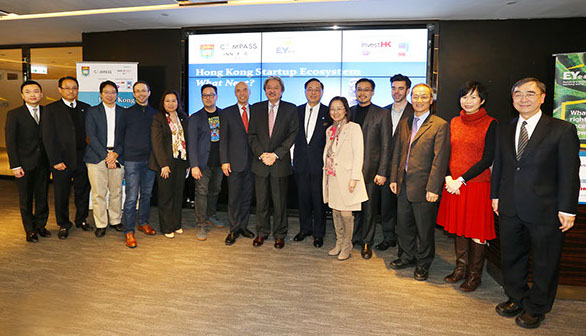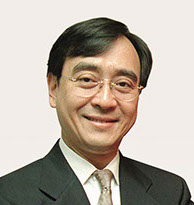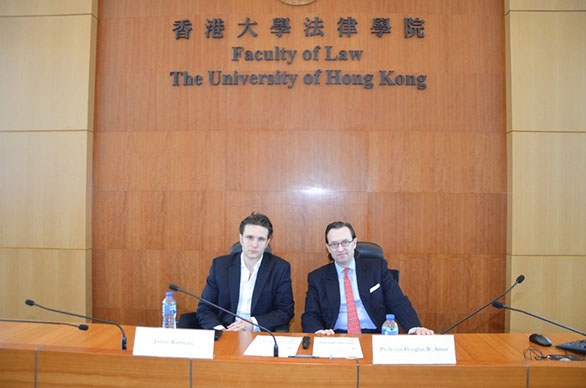
FINDING A NEW GROOVE
Economic activity has defined Hong Kong in ways that cannot be said of most other cities. The pragmatic focus on the bottom line has enabled it to thrive in the wake of war, revolution, political uncertainty, major financial crises and disease scares (e.g.SARS). Now the economy faces direct challenges from changing demographics, regional and global competition, and rapid technological development, can the city stay strong and flourish? Two HKU scholars see an optimistic future.

The late economist Milton Friedman declared in 1990 that Hong Kong was the best example in the world of a free market economy. Its combination of entrepreneurialism, rule of law and a government that mostly refrained from meddling in the market, set free a can-do spirit and dynamism that were the envy of many.
Today Hong Kong feels rather different. Although still ranked the world’s freest economy (by the US think tank, the Heritage Foundation), and a leading centre of international finance, the city’s raw energy has become more tamed, its economy a little more regulated. Competitors from the Mainland and the West are snapping at its heels. Can Hong Kong recapture some of its old dynamism?
Professor Yue-chim Richard Wong, Philip Wong Kennedy Wong Professor in Political Economy, and Professor Douglas Arner of the Department of Law have each been involved in recent studies looking at Hong Kong’s future economic prospects. Professor Wong led HKU’s contribution to a major study on Hong Kong’s start-up ecosystem involving San Francisco-based research firm Compass and local firm Innofoco. Professor Arner is the project coordinator of a Theme-based Research Scheme (TRS) project entitled ‘Enhancing Hong Kong’s Future as a Leading International Financial Centre’, a five-year undertaking that also involves the Chinese University of Hong Kong, Hong Kong Polytechnic University and Oxford University.
Both scholars see opportunities waiting to be seized, from the chance to be a hub that supports start-ups, to advancing Hong Kong’s position as a regional and international finance centre. But first, the city needs to get out of the doldrums and adopt the right mindset.

San Francisco-based research firm Compass, HKU and local firm Innofoco released a report on the Hong Kong Startup Ecosystem. The forum was attended by the Honourable Mr John Tsang (centre), the Financial Secretary of the HKSAR Government.

![]() Hong Kong’s great asset is no longer just its people. Our open economic system and global networks, our legal system and logistics system and low tax regime, are also assets.
Hong Kong’s great asset is no longer just its people. Our open economic system and global networks, our legal system and logistics system and low tax regime, are also assets. ![]()
Professor Yue-chim Richard Wong
Glory days
Hong Kong’s economic reputation was built on two things: entrepreneurship and entrepôt, one related to its people, the other to its position as the gateway to China. As Professor Wong has outlined in his forthcoming book, Rekindling Hong Kong’s Magic and the Challenge of Inequality, the city’s post-war success was driven by a huge influx of refugees fleeing revolutionary China. They brought not only their labour and strong work ethic, but businesses ranging from banking to garment manufacturing to shipping to movie-making. And they were highly entrepreneurial. The baby-boom generation that followed similarly focussed on making money and experienced extraordinary opportunities from being in the right place at the right time in the early days of globalisation and China’s opening.
Three generations in and the situation is quite different. People are wealthier but events such as the 1997 Asian financial crisis have led to more inequality. Hong Kong has prospered from its connections with China but now faces more competition from there. Hong Kong also has one of the world’s lowest birth rates, meaning there are fewer young people around and therefore fewer entrepreneurs to drive economic growth (young people are more likely than their elders to become entrepreneurs). Moreover, said Professor Wong, today’s youth appear to be less willing to risk setting up their own business than their parents and grandparents were at the same age.
“Hong Kong did well in the past, but it started on a low level,” he said. “Its people had a lot of ideas for making money and an environment was created to support those ideas. But the world has changed, the people have changed. If Hong Kong is to move forward, we cannot just embrace the past.
“Hong Kong’s great asset is no longer just its people. Our open economic system and global networks, our legal system and logistics system and low tax regime, are also assets.”
These assets are particularly useful in an area that harks back to Hong Kong’s entrepreneurial past – that of start-ups, which have become a leading source of economic growth and job creation around the world. As Professor Wong puts it, Hong Kong does not necessarily have to create its own start-ups to be a start-up hub because it already has the strong supportive environment and global connections that other entrepreneurs are looking for. “It would make sense to have people come to Hong Kong to do business that supports start-ups around the world, not just in Hong Kong,” he said.
The Compass study in which he was involved makes a case for that role. It ranked Hong Kong the fifth fastest-growing start-up ecosystem in the world out of 40 studied, with the caveat that there is still a lot of catching up to do (Hong Kong ranked only 25th overall). It also offered ideas on how this could be achieved.
Hong Kong is already well-plugged into national and global networks. It could take these in new directions by linking ideas, capital, talents, production facilities and markets to become a ‘Super Connector’ in the words of the study report. It could play to its strengths as a service economy, particularly in financial services, supply chain management and professional services, and consider its advantage as a test market for new ideas given the city’s East-West culture and the high penetration of broadband and mobile networks.
The Government could support Hong Kong’s transformation into a start-up hub by making this the focus of global marketing campaigns, easing the path for talent to come here and set up business, and ensuring regulations keep pace with technological changes. Government and business could also help create demand for innovation (some firms already are, notably in finance).
But more fundamentally, the Government needs to start rethinking its model for Hong Kong’s development and how to move from an efficiency-driven model of economic development to an innovation-driven model.
Professor Wong cited the mobile service Uber as an example of the role Hong Kong could play in the global start-up ecosystem. “Uber is the biggest taxi company in the world but it owns no taxis – it’s a coordinator. This is the real model for Hong Kong,” he said.

![]() We have the advantage in terms of location, time zone, culture, political environment, but we’re not necessarily the only choice. The risk is that those
We have the advantage in terms of location, time zone, culture, political environment, but we’re not necessarily the only choice. The risk is that those
institutions decide to follow the route that most other financial institutions have
followed and put their international headquarters in London. Or they are lured to Singapore, which is also competing for this role. For Hong Kong, it’s an opportunity
that is ours to lose. ![]()
Professor Douglas Arner
Finance at the forefront
Professor Arner’s take on Hong Kong’s economic prospects starts with its present position as a leading international finance centre and the dangers in taking that for granted.
“Something that has come out of our research is that too much finance in any jurisdiction is not necessarily good,” he said. Crunch times like the 2008 global financial crisis can hit the economy especially hard in those circumstances. But because 30 per cent of Hong Kong’s GDP is in the finance sector, and 20 per cent of employment, it can hardly afford to set off in new directions. Professor Arner’s TRS is therefore looking at ways to reduce Hong Kong’s vulnerability and develop its finance sector in new, promising directions.
The TRS highlights the importance of beefing up Hong Kong’s role as a regional and international headquarters for Mainland and international financial institutions, and the leading offshore centre for RMB transactions.
“Hong Kong in a sort of entrepôt role provides an intersection for these institutions,” Professor Arner said. “We have the advantage in terms of location, time zone, culture, political environment, but we’re not necessarily the only choice. The risk is that those institutions decide to follow the route that most other financial institutions have followed and put their international headquarters in London. Or they are lured to Singapore, which is also competing for this role. For Hong Kong, it’s an opportunity that is ours to lose.”
Similarly, London is seeking to usurp Hong Kong’s leadership in handling offshore RMB transactions. This is an area that will only expand given the growing acceptance of the currency. Last autumn the International Monetary Fund added the RMB to its basket of major reserve currencies alongside the dollar, euro, sterling and yen.

Graphs comparing employment in the fields of legal and accounting, real estate and finance in Hong Kong, London and New York.
(Source: Wojcik & Zhao [2014], calculations based on: Longitudinal Employer–Household Dynamics, Census Hong Kong, NomisWeb)
So how does Hong Kong strengthen itself? For one thing, it needs to plug gaps in its labour force, Professor Arner said. One study under the TRS has compared the employment composition in the finance sectors of Hong Kong, London and New York, and found Hong Kong lagging significantly behind in the number of people employed in professional services, such as legal services and accounting. A lot of the demand in this field has arisen from regulatory changes made after 2008 to rein in excesses, which has meant firms and regulators need more staff who can focus on compliance activities and reduce the risks in the finance sector. (HKU is helping to address this gap through the new Master of Laws in Compliance and Regulation to be offered in the autumn.)
An even bigger opportunity for Hong Kong to gain an edge lies in innovation, in particular ‘fintech’ or finance technology.
“Finance is already one of the world’s most digitised industries, and it’s one of the sectors that spends the most on information technology,” Professor Arner said. “In Hong Kong, we already have major financial institutions and service providers like technology firms advising those firms. Unlike industry, which Hong Kong doesn’t have much of any more, financial services and financial services technology is an area where we have major strength and existing opportunities to grow. This is not speculative.”
DBS and Standard Chartered Bank have both funded fintech start-up incubators in Hong Kong. Professor Arner has also noticed that people laid off in the wake of the global financial crisis are now launching tech start-ups. “Many of them are doing this instead of starting hedge funds,” he said. “It’s a pretty dynamic environment for fintech start-ups.”

Janos Barberis (left), Research Fellow of the Asian Institute of International Financial Law, and Professor Douglas Arner (right) at the seminar on Regulating FinTech Innovation: A Balancing Act in April, 2015.
Change your minds
For Hong Kong to really take advantage of these opportunities, and set it on a new path of economic development, it does require one other fundamental thing: people need to get on board with these ideas. That should not be such a stretch given, as Professor Arner points out, Hong Kong successfully developed a world-class regulatory environment from the lessons learned in the stock-market crash of 1987, Asian financial crisis, minibonds scandal and 2008 global financial crisis. But there is a danger of hesitation.
“The challenge at the moment for Hong Kong as I see it from a regulatory standpoint is changing the post-crisis mindset to begin looking at things like fintech, where there is very much a need to both consider the risks and the opportunities. And to realise that if we take too conservative an approach, we may miss one of our best opportunities to really develop going forward,” he said.
Professor Wong takes a more fundamentalist view. “Hong Kong needs a mindset change across all segments of society if it is to become the epicentre of start-up activities in Asia – including the Government, business, investors, start-ups to parents and our younger generation,” he said. “Successful start-ups and investors do not just work for money. They seek to solve the world’s problems with passion and commitment. Hong Kong has to change its overly mercenary, materialistic and short-term culture if it is to truly develop its own breed of game-changing and
world-changing start-ups.”
He is optimistic that that can be achieved. “I believe we are coming to the end of pessimism over Hong Kong’s entrepreneurial spirit,” he added.
Next

